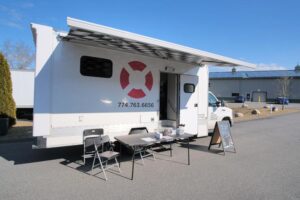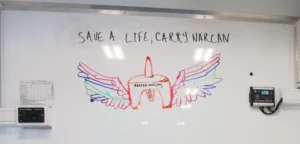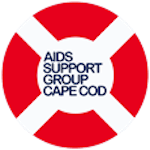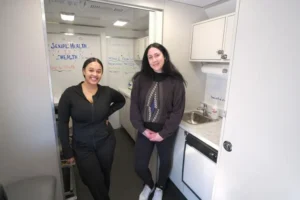
ASGCC Falmouth Outreach Van
Health Van: A ‘Beautiful Byproduct’ Of A Bitter Controversy
Feb 16, 2023
In an empty parking lot in East Falmouth, harm reduction specialist Bridget J. Volk carefully arranged displays of naloxone, snacks and condoms on a plastic fold-up table. Behind her was the AIDS Support Group of Cape Cod’s (ASGCC) mobile outreach van. Ms. Volk drives the van to locations around Falmouth to provide free sexual health screenings, clean syringes, fentanyl test strips and wound care.
Ms. Volk is passionate about her work because she herself is in recovery and has lost “countless friends” to substance use, she said. “I can’t imagine doing any other kind of work but this,” she said.
The van’s services are for anyone who feels at risk of contracting HIV, including people struggling with substance use disorder, said Dan Gates, president and chief executive officer of ASGCC. However, anyone can approach the van to get free naloxone (a medication used to reverse opioid overdoses) and naloxone training.
On this bright, cold February morning in the parking lot, Ms. Volk was joined by harm reduction specialist and phlebotomist Sage J. Santos, who draws blood for sexually transmitted disease testing. The two operate the van together.
The van is surprisingly spacious, and its two testing rooms can be sectioned off with dividers for client privacy. There is also a bathroom where clients can take their own urine, vaginal or rectal samples.
Whiteboards lining the walls are covered with colorfully written messages. “Save a life, carry Narcan,” one says. “Got lube? We do!!!” says another. “Ask us about PrEP! (a pill taken daily to prevent HIV)” says another.
Ms. Volk and Ms. Santos care for clients at sites around town, counseling them directly and also making referrals to additional social services. All services are free and confidential.
The van parks at the Falmouth Service Center every Wednesday from 3 to 5 PM, and the first and third Friday of every month from 10 AM to noon. It also parks at WellStrong, a gym serving the recovery community, on Teaticket Highway from 9 AM to noon on the last Friday of the month; and at Rocky’s Gym on East Falmouth Highway on Mondays from 10 AM to noon, when Rocky’s Gym opens its showers to the homeless. The van also serves clients at Foundations Recovery Center and Recovering Champions.
How It All Started
The mobile outreach van was ready to launch in spring 2020. But then COVID hit, Mr. Gates said, and the launch was delayed until vaccines came to market. But the history of AGSCC’s van goes back much further. In 2018, the Falmouth Board of Health voted unanimously to allow ASGCC to open an office on East Falmouth Highway that would have a syringe exchange program.
When area residents learned of the plan, many objected strenuously. The site’s proximity to St. Anthony’s Church concerned some, who feared children attending church programs might interact with drug users. Others said the exchange would attract people with diseases to a residential area. Many also complained that they had not heard about the syringe program earlier. Others said it was a poor use of state funding. “The announcement of our site unleashed a type of anger, hatred and tumultuous behavior that we believe has made the current site unsafe for our clients, staff and other participants,” Joe Carleo, ASGCC’s CEO at the time, wrote in a statement.
Syringe exchange programs allow people who use drugs to safely dispose of used syringes and get clean ones. This helps prevent the spread of sexually transmitted infections, such as hepatitis C and HIV, according to the Centers for Disease Control and Prevention. Syringe exchange programs often include education about overdose prevention and safe injection practices.
Within recovery and harm reduction communities, it is well known that much of the work that needs to be done to fight the opioid crisis has to do with reducing the stigma around drug use. And reducing that stigma often starts with education, Mr. Gates said. “We realized we needed to just make sure we met with the community and explained the nuances of our services,” he said. “By and large, as soon as people were in a room and hearing about what the services looked like, it really started a path toward understanding.” Mr. Gates said that people often think about those who use drugs as “other people,” not their neighbors. “Falmouth is one of the higher risk communities on the Cape,” Mr. Gates said. “It’s very impacted by the opioid epidemic, which is actually why we chose Falmouth as a town to go to and offer services.”
Eventually, ASGCC and the Falmouth community came to a sort of compromise or, as Mr. Gates called it, “A beautiful byproduct of that situation.” The community and ASGCC agreed that the ASGCC office could open at the proposed location on East Falmouth Highway, and the syringe services would be offered only though the van.

A nasal naloxone (known as Narcan) spray bottle sprouts angel wings on one of the van’s white boards.
(GENE M. MARCHAND/ENTERPRISE)
Where It Is Now
Following the onset of the COVID-19 pandemic, opioid overdose deaths rose nationwide, Mr. Gates said. However, though the number of hepatitis C cases on Cape Cod soared in 2014 in conjunction with the opioid crisis, the rate of infectious disease transmission on Cape is now “very low,” Mr. Gates said. “That’s largely because of access to syringe services, which prevent people from sharing needles,” he said.
One client, who will remain anonymous to protect the client’s privacy, wrote that they were first introduced to the van’s services through a treatment center. The client used the van four times to get supplies for safe drug use and to get tested. “So much was changing in my life,” the client wrote. “I don’t think I would have been tested without them being mobile.” The client has also used the van to stock up on naloxone and fentanyl test strips. The strips allow users to test if a substance they plan to inject or snort contains the more potent and deadly synthetic opioid. This client wrote that while they hope they will not need to go back for more harm reduction supplies, they like having the option available. “I was living in an area without this option for years, and it led to me sourcing supplies off corners or simply risking it,” they wrote.
Another client, who will also remain anonymous, also accessed the van through a treatment facility they were a patient at, they wrote. The client’s experience getting tested for sexually transmitted diseases was “discreet, comfortable, compassionate, professional, and informative,” they wrote. The participant also wrote that they “absolutely” plan to go back to the van for services in the future. “The resources and capabilities of the van and its personnel are a vital asset to harm reduction and the community at large,” the client wrote.


